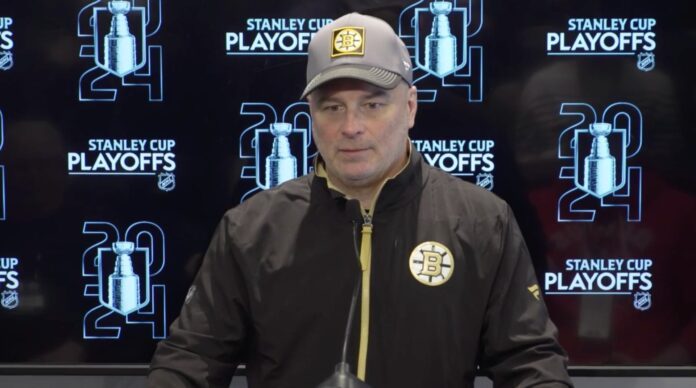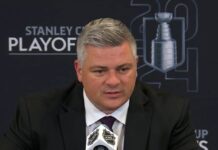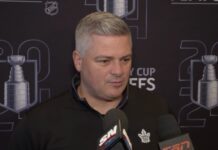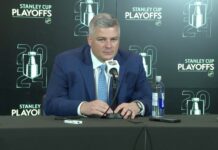
On an off-day between Games 2 and 3, Bruins head coach Jim Montgomery discussed losing defenseman Andrew Peeke for the rest of the series, the areas where he wants to see improvement from his team, and the challenge of shutting down Auston Matthews.
How tough is the news about Andrew Peeke’s injury?
Montgomery: It is a tough blow. He has been really good for us. We have played all year, and every defenseman that is on the trip — Lohrei, Wotherspoon — have played really good hockey for us. It is a position of strength for us. The depth is good.
Does Peeke’s injury expedite Derek Forbort’s possible return?
Montgomery: No, it doesn’t. With Forbort, he is not week-to-week anymore. He is day-to-day. As far as being an option for Game 3, we don’t see it.
What could Mason Lohrei provide in terms of getting the puck down the ice?
Montgomery: His poise with the puck, his ability to find middle ice, and his ability to make plays in the offensive zone is something that we are going to possibly look at for the next game. Also, his willingness to go back for pucks is a strength.
You mentioned the team wasn’t playing fast enough after Game 2. What is that a function of?
Montgomery: Toronto didn’t give us many odd-man rushes. I think we had three by our calculations. We only gave up two. It is one of those games where we need to win more one-on-one battles down low at both ends to be able to create more offense.
Defensively, I thought we were better in a lot of areas that we think are really important. Our goaltenders have been up to the task. Offensively, it is just not there. We need to be better on the forecheck. We need to be more patient once we have it as far as when to attack the net and when we shouldn’t with our decision-making with the puck in the offensive zone.
Does the forecheck depend on being cleaner and crisper on the exits?
Montgomery: No, not so much. We were pretty clean on our exits in Game 1. We didn’t like our forecheck in Game 1, either. Everyone has to do their job. F1 has to do his job, F2 has to run the right route, and F3 has to run the right route so that we can create loose pucks and have the numbers there to create a possession.
In the past, your team has done a good job of limiting Auston Matthews. He was going to break through at some point. How do you limit what he does to you moving forward?
Montgomery: I think we have done a pretty good job. Great players are going to make plays. What I have been impressed about with him is how tenacious he has been on pucks and how tenacious he has been on the forecheck. He has been relentless with his forecheck.
On the first goal, he wins the battle and rings it off the crossbar. It ends up in our net, right? On the other play, he gets in behind us. We can’t let him in behind us. That is the most dangerous man on the ice. You have to be tighter.
He is the most dangerous man on the ice because he has earned it.
Do you anticipate any lineup changes ahead of Game 3?
Montgomery: We haven’t decided yet. We have just looked at the team game. We will analyze the individual game changes that we think might be needed, and then we will make final decisions tomorrow.
Does the element of not wanting players sitting for too long factor into the decision-making at all, or is it all based on what you are seeing on the ice and in the matchups?
Montgomery: It is all individual performance, matchups, and what we think might give us an advantage. If guys are playing well and doing well, you are not going to make changes.
How does Morgan Geekie’s faceoff presence help in the set play department?
Montgomery: It enhances them because you raise your chances to win the faceoff. Specifically, if we look at Pastrnak’s goal, a right-shot center on the right dot offensively is going to win more draws than a left shot, typically—unless you have Bergeron. You can put him out there anywhere.


































